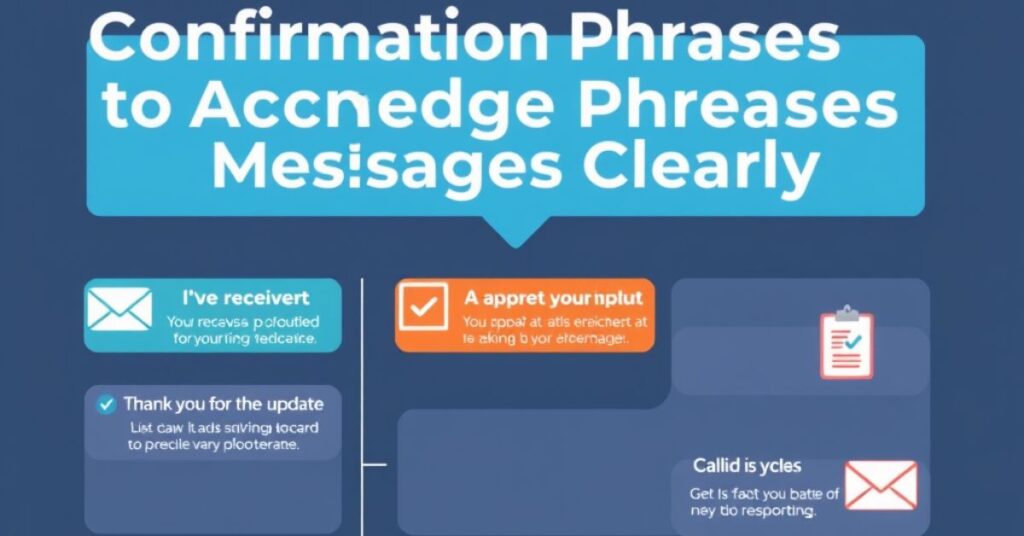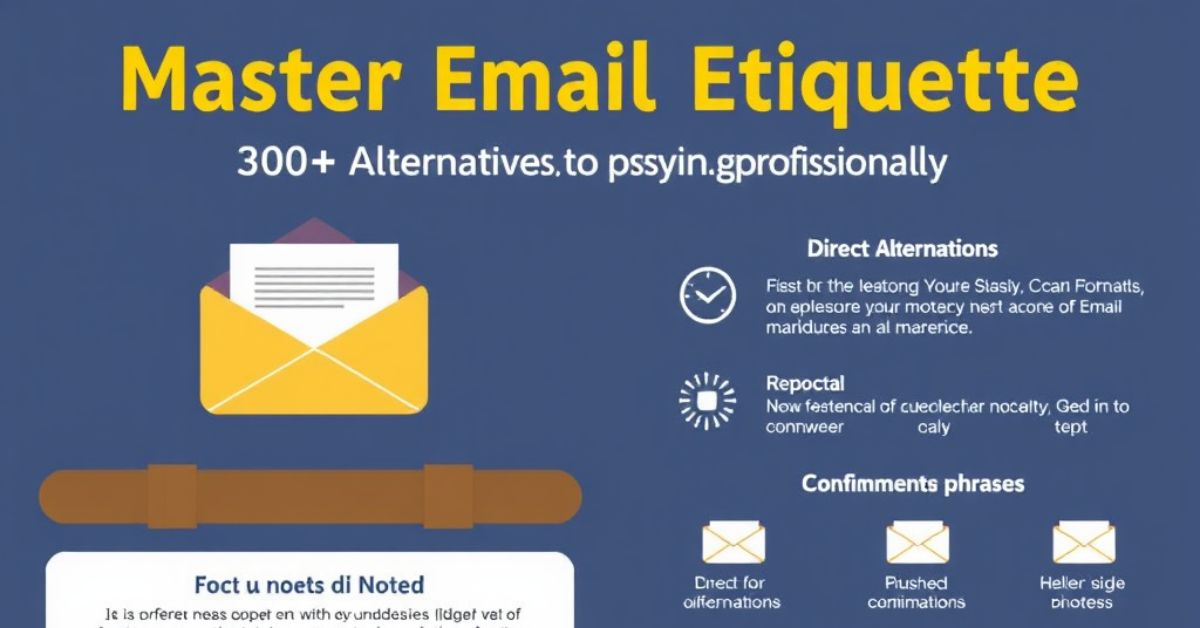In the fast-paced world of business communication, the phrase “noted” often emerges as a default response. While it serves the purpose of acknowledgment, it can come across as curt or impersonal.
This article dives deep into the art of email communication, offering over 300 alternatives to “noted” that can enhance your professional interactions.
Whether you’re looking to express understanding, show courtesy, or simply add a personal touch, you’ll find a variety of responses to suit every situation.
Direct Alternatives to ‘Noted’ for Prompt Replies
When you need to acknowledge a message swiftly without sounding robotic, consider these alternatives:
- “Acknowledged, thank you!”
- “Got it, thanks!”
- “Understood, appreciate the update.”
These phrases clearly communicate that you’ve received the information while adding a layer of warmth.
Confirmation Phrases to Acknowledge Messages Clearly

For those moments when you want to confirm receipt with clarity, try these:
- “I’ve received your message and will review it shortly.”
- “Thanks for the heads-up; I’ll take it from here.”
- “This is received; I’ll follow up soon.”
These responses lay the groundwork for further communication, showing you’re engaged.
Expressing Understanding: How to Show You’ve Got the Message
To convey that you fully grasp the content of the communication, these phrases work wonders:
- “I see what you mean; let’s proceed accordingly.”
- “Your points are clear; I will act on them.”
- “I understand your concerns and will address them.”
Using these alternatives demonstrates active listening and comprehension.
Polite Ways to Acknowledge Emails Professionally
Maintaining a sense of professionalism is crucial.
Here are some polite ways to acknowledge emails:
- “Thank you for your message; I appreciate your input.”
- “Your email is important to me; I will respond in due time.”
- “I appreciate you reaching out; I’ll get back to you soon.”
These responses ensure the other party feels valued.
Tips for Crafting Clear and Effective Email Responses
To make your email replies stand out, consider these tips:
- Be concise: Get to the point while remaining polite.
- Use the recipient’s name: Personalization creates a connection.
- Incorporate a positive tone: This fosters goodwill.
Positive and Affirmative Email Replies
Positivity can transform an email interaction.
Use these affirmations:
- “Absolutely, I’m on it!”
- “That sounds great; I’ll take care of it!”
- “I’m excited to get started!”
Such phrases promote enthusiasm and collaboration.
Ways to Show Courtesy and Acknowledgment in Emails
Courtesy goes a long way in professional settings.
Here are some courteous responses:
- “Thank you for bringing this to my attention.”
- “I appreciate your prompt communication.”
- “Your diligence is commendable; I’ll respond shortly.”
These phrases express gratitude and respect.
Quick and Thoughtful Email Responses
In the age of quick communication, these short responses can save time:
- “Noted, thanks!”
- “Received, will act accordingly.”
- “Thanks for the update!”
These succinct replies maintain professionalism without being overly formal.
Building Trust with Assuring Email Replies
Trust is essential in any professional relationship.
Use these phrases to build trust:
- “You can count on me to follow through.”
- “I’ll ensure this is handled properly.”
- “Rest assured, I’m on top of it.”
Such assurances foster reliability.
How to Express Gratitude in Professional Emails?
Gratitude can strengthen connections.
Here are some ways to express it:
- “Thank you for your valuable insights!”
- “I appreciate your help with this matter.”
- “Your support means a lot to me.”
Expressing thanks can enhance the relationship further.
Short and Professional Email Confirmations
For those times when brevity is key, consider:
- “Confirmed.”
- “Noted, thank you!”
- “Acknowledged.”
These straightforward phrases convey professionalism efficiently.
Maintaining Politeness in Business Emails
Staying polite is paramount.
Here are some phrases to ensure you do:
- “I appreciate your understanding.”
- “Thank you for your patience.”
- “Your cooperation is greatly appreciated.”
Politeness fosters a positive atmosphere.
Elevating Professionalism in Email Responses
To take professionalism up a notch, try:
- “I value your input and will consider it carefully.”
- “Thank you for your detailed message; I’ll review it thoroughly.”
- “I appreciate your thoroughness in this matter.”
Elevating your language can reflect well on you.
How to Provide Informative and Acknowledging Replies?
When you need to acknowledge while providing additional information, use:
- “Thank you for sharing; I’ll incorporate this into our plan.”
- “I appreciate the details; I have a few questions.”
- “Thank you; this aligns perfectly with our goals.”
These responses are informative and respectful.
Polite Ways to Acknowledge Emails with Courtesy
Politeness is key in professional correspondence. Consider:
- “Your email is appreciated; I’ll get back to you shortly.”
- “Thank you for your message; it’s well-received.”
- “I’m grateful for your insights, and I’ll respond soon.”
These alternatives keep the communication courteous.
Timely Responses to Acknowledge Emails
Timeliness is crucial. These phrases can help:
- “I’ll reply with more information shortly.”
- “Thank you for your message; I’ll follow up by EOD.”
- “I appreciate your patience; I’ll get back to you soon.”
Promptness is a sign of respect.
Responding Respectfully to Professional Emails
Respect should always be a priority.
Use these respectful alternatives:
- “Thank you for your thoughtful email.”
- “I appreciate your dedication to this matter.”
- “Your effort is highly valued; I’ll be in touch.”
Respectful language fosters strong professional relationships.
Conveying Gratitude in Professional Correspondence
Make gratitude a habit with these phrases:
- “Thank you for your ongoing support.”
- “I’m grateful for your guidance.”
- “Your assistance is invaluable; thank you.”
Gratitude can significantly enhance workplace dynamics.
Quick Acknowledgments for Business Emails
In today’s fast-paced environment, quick acknowledgments are essential:
- “Thanks for the update!”
- “Noted, I’ll act accordingly.”
- “Got it; I appreciate it!”
These quick responses maintain momentum.
Essential Tips for Crafting Professional Emails
Here are some essential tips to keep in mind:
- Proofread: Always check for typos and errors.
- Be clear: Avoid jargon and be straightforward.
- Stay organized: Use bullet points for clarity.
Choosing the Right Phrase for Every Situation
Context matters. Here are some tailored phrases:
- For formal situations: “Acknowledged with thanks.”
- For casual situations: “Got it, thanks!”
- For follow-ups: “Thank you for your update; I’ll respond soon.”
Tailoring your response can enhance communication.
The Most Effective Alternatives to “Noted”
Here are some standout alternatives:
- “Understood, I’ll take action.”
- “Thank you for the information; it’s appreciated.”
- “I’ve taken note of this; thanks!”
These phrases add depth to your acknowledgment.
Formal Acknowledgment to Avoid Redundancy
To avoid redundancy, consider:
- “Thank you for your correspondence; it’s noted.”
- “Your message is acknowledged; I will respond shortly.”
- “I appreciate your email and will take it under advisement.”
These formal alternatives maintain professionalism.
How to Express Agreement Professionally?
When you agree, use these phrases:
- “I concur with your assessment; let’s proceed.”
- “I agree with your suggestions; they align with our objectives.”
- “Your points are valid; I’m on board.”
Agreement fosters collaboration.
Acknowledging and Understanding Messages Clearly
To show understanding, try:
- “I fully grasp your points and will act accordingly.”
- “Your message is clear; I’ll ensure it’s addressed.”
- “I understand your perspective; thank you for sharing.”
Clear acknowledgment reinforces communication.
The Role of Personalization in Professional Emails
Personalizing emails can make a significant difference:
- “I enjoyed our last conversation; your insights were valuable.”
- “Based on our previous discussion, I believe…”
- “It was great to hear from you; I appreciate your input.”
Personal touches can enhance relationships.
How to Adapt Email Replies to Different Contexts?
Adaptation is key.
Here’s how:
- For urgent matters: “I’ll prioritize this and respond quickly.”
- For informational updates: “Thank you for the details; I’ll review them.”
- For feedback requests: “I appreciate your feedback and will consider it.”
Adapting your responses ensures relevance.
The Dos and Don’ts of Professional Email Replies
Keep these dos and don’ts in mind:
- Do: Be clear and respectful.
- Don’t: Use jargon or overly complex language.
- Do: Personalize when appropriate.
- Don’t: Be overly casual in formal contexts.
Following these guidelines can enhance communication.
Tips for Effective Communication
Effective communication is essential.
Consider these tips:
- Listen actively: Show you value the sender’s input.
- Be concise: Respect the recipient’s time.
- Follow up: Keep the conversation going.
How to Tackle Follow-Up Queries Effectively?
For follow-ups, try:
- “Thank you for your patience; I’m following up on this.”
- “I appreciate your reminder; I’ll have an update soon.”
- “Thank you for checking in; I’m on it.”
Following up shows diligence.
How to Keep a Positive Tone in Emails?
Maintaining a positive tone is crucial.
Use phrases like:
- “I’m looking forward to working together!”
- “Thank you for your support; it’s greatly appreciated.”
- “I’m excited about this opportunity!”
Positivity can uplift any conversation.
Cultural Awareness in Email Communication
Cultural nuances matter.
Keep these in mind:
- “I appreciate your perspective; it enriches our discussion.”
- “Thank you for sharing your insights; they’re valuable.”
- “I respect your approach and will consider it.”
Cultural sensitivity enhances communication.
How Active Listening Improves Email Responses?
Active listening can transform responses:
- “Thank you for your input; I will reflect on it.”
- “I appreciate your thoughts; they’ll guide my response.”
- “Your feedback is noted; I’ll consider it carefully.”
Active listening shows respect and engagement.
Why Proofreading Is Key in Professional Emails?
Proofreading ensures clarity and professionalism:
- “I’ve double-checked my response for accuracy.”
- “I appreciate your understanding as I finalize my reply.”
- “Thank you for your patience; my response is polished.”
Well-proofed emails reflect professionalism.
Noted Meaning in Urdu
The word “noted” translates to “نوٹ کیا” (not kiya) in Urdu, indicating acknowledgment or recognition of information.
Noted Meaning
“Noted” signifies that something has been acknowledged or recognized. It’s often used to confirm receipt of information.
Noted Aromas
In a different context, “noted aromas” refers to distinctive scents recognized in culinary or sensory experiences, often used in gastronomy or perfumery.
Noted Meaning in Hindi
In Hindi, “noted” can be translated as “नोट किया” (note kiya), conveying similar meanings of acknowledgment.
Noted with Thanks
“Noted with thanks” expresses gratitude along with acknowledgment, indicating the sender appreciates the information received.
What is Noted with Thanks Meaning in Urdu?
In Urdu, “noted with thanks” translates to “نوٹ کیا، شکریہ” (not kiya, shukriya), which conveys acknowledgment with gratitude.
Noted Synonym
Synonyms for “noted” include “acknowledged,” “recognized,” “observed,” and “recorded.”
Noted Sir Meaning in Urdu
In Urdu, “noted sir” can be translated as “نوٹ کیا، سر” (not kiya, sir), typically used in formal communication to acknowledge a superior.
Noted Please Meaning in Urdu
“Noted please” in Urdu would be “نوٹ کیا، براہ کرم” (not kiya, barah-e-karam), which is a polite request for acknowledgment.
OK Noted Meaning
“OK noted” is an informal way to acknowledge receipt of information, expressing both understanding and acceptance.
Noted App
The Noted app is a digital tool designed for taking notes, organizing thoughts, and managing tasks effectively.
Noted Sir Meaning
The “Noted sir” is a respectful acknowledgment commonly used in professional or military contexts, signaling that instructions or information have been understood.
Noted Movie
The “Noted” may refer to a film title, often highlighting themes of acknowledgment or communication.
Noted Website
A “noted website” typically refers to a well-recognized online platform that provides valuable content or services.
How to Pronounce Noted?
“Noted” is pronounced as /ˈnoʊ.tɪd/, with emphasis on the first syllable.
Conclusion
Mastering email etiquette enhances your professional interactions and fosters better communication. By using diverse alternatives to “noted,” you can convey acknowledgment, appreciation, and professionalism. We encourage you to try these phrases in your next correspondence and elevate your email game!

Emily Rose Johnson is a passionate writer with a knack for crafting engaging content. She specializes in communication strategies, digital marketing, and creative storytelling.









